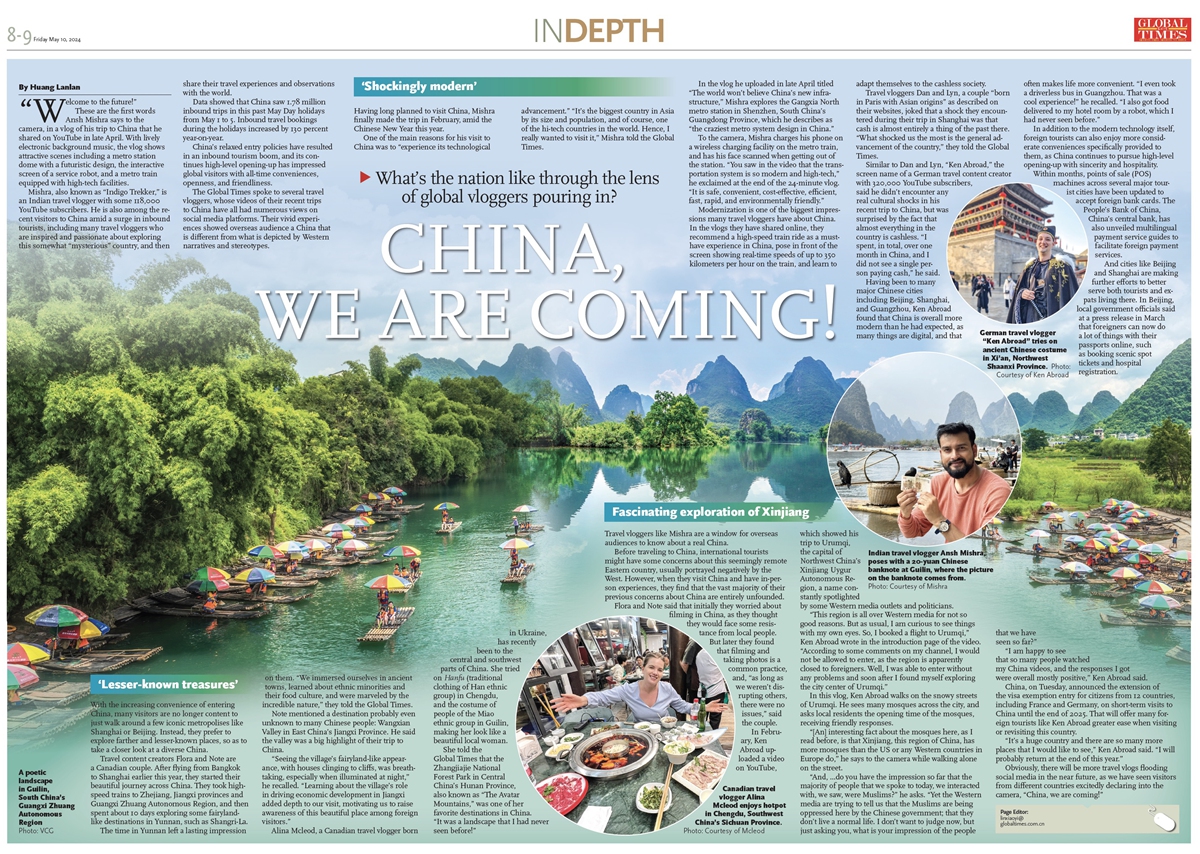
A poetic landscape in Guilin, South China's Guangxi Zhuang Autonomous Region. Photo: VCG
"Welcome to the future!"
These are the first words Ansh Mishra says to the camera, in a vlog of his trip to China that he shared on YouTube in late April. With lively electronic background music, the vlog shows attractive scenes including a metro station dome with a futuristic design, the interactive screen of a service robot, and a metro train equipped with high-tech facilities.
Mishra, also known as "Indigo Trekker," is an Indian travel vlogger with some 118,000 YouTube subscribers. He is also among the recent visitors to China amid a surge in inbound tourists, including many travel vloggers who are inspired and passionate about exploring this somewhat "mysterious" country, and then share their travel experiences and observations with the world.
Data showed that China saw 1.78 million inbound trips in this past May Day holidays from May 1 to 5. Inbound travel bookings during the holidays increased by 130 percent year-on-year.
China's relaxed entry policies have resulted in an inbound tourism boom, and its continues high-level opening-up has impressed global visitors with all-time conveniences, openness, and friendliness.
The Global Times spoke to several travel vloggers, whose videos of their recent trips to China have all had numerous views on social media platforms. Their vivid experiences showed overseas audience a China that is different from what is depicted by Western narratives and stereotypes.
'Shockingly modern'
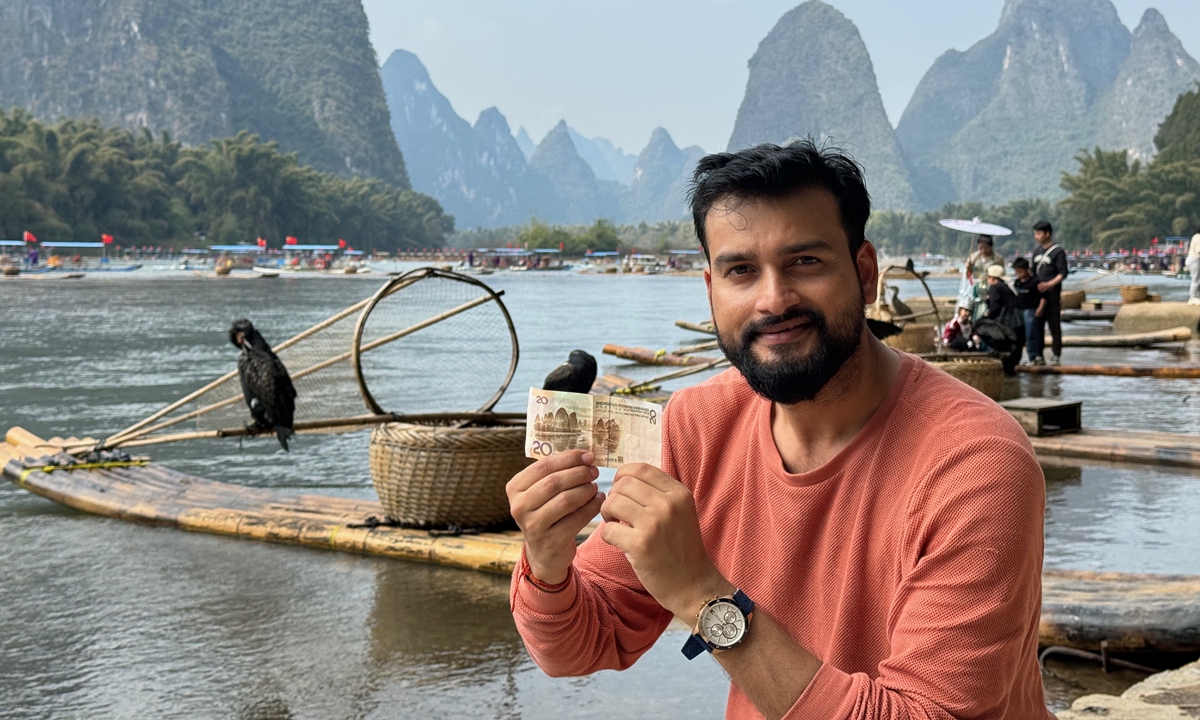
Indian travel vlogger Ansh Mishra poses with a 20-yuan Chinese banknote at Guilin, where the picture on the banknote comes from. Photo: Courtesy of Mishra
Having long planned to visit China, Mishra finally made the trip in February, amid the Chinese New Year this year.
One of the main reasons for his visit to China was to "experience its technological advancement." "It's the biggest country in Asia by its size and population, and of course, one of the hi-tech countries in the world. Hence, I really wanted to visit it," Mishra told the Global Times.
In the vlog he uploaded in late April titled "The world won't believe China's new infrastructure," Mishra explores the Gangxia North metro station in Shenzhen, South China's Guangdong Province, which he describes as "the craziest metro system design in China."
To the camera, Mishra charges his phone on a wireless charging facility on the metro train, and has his face scanned when getting out of the station. "You saw in the video that the transportation system is so modern and high-tech," he exclaimed at the end of the 24-minute vlog. "It is safe, convenient, cost-effective, efficient, fast, rapid, and environmentally friendly."
Modernization is one of the biggest impressions many travel vloggers have about China. In the vlogs they have shared online, they recommend a high-speed train ride as a must-have experience in China, pose in front of the screen showing real-time speeds of up to 350 kilometers per hour on the train, and learn to adapt themselves to the cashless society.
Travel vloggers Dan and Lyn, a couple "born in Paris with Asian origins" as described on their websites, joked that a shock they encountered during their trip in Shanghai was that cash is almost entirely a thing of the past there. "What shocked us the most is the general advancement of the country," they told the Global Times.
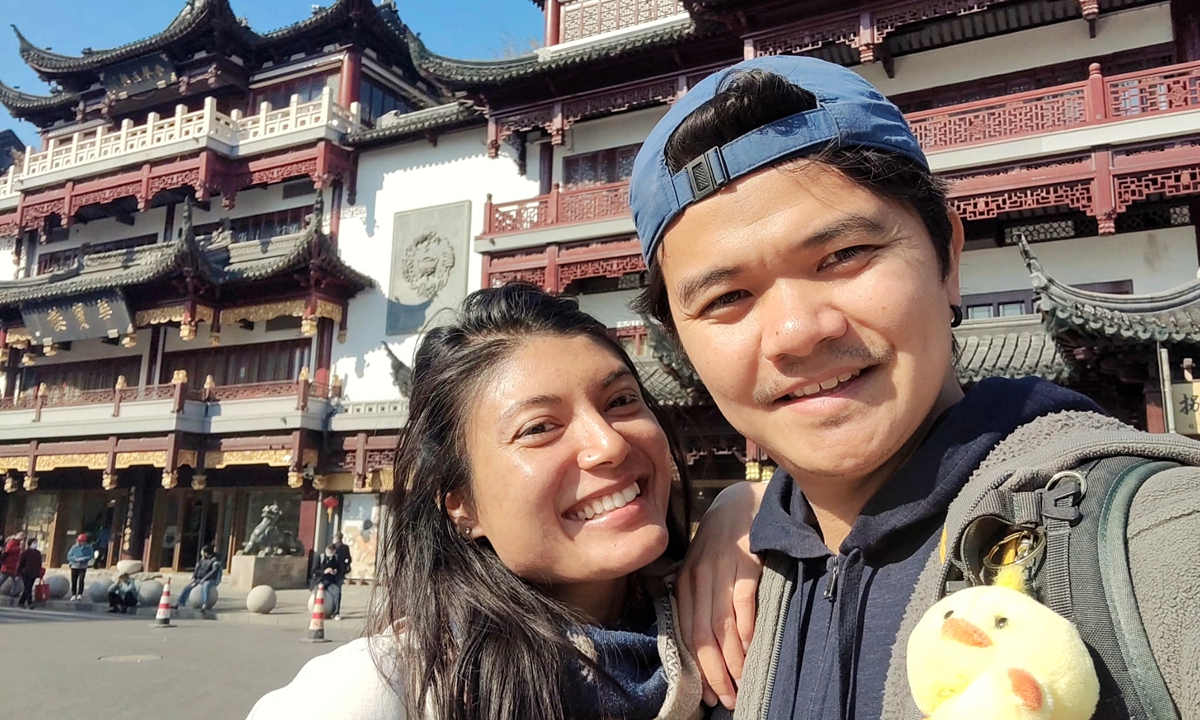
French travel vloggers Dan and Lyn pose at the surrounding of Yuyuan garden in Shanghai. Photo: Courtesy of the couple
Similar to Dan and Lyn, "Ken Abroad," the screen name of a German travel content creator with 320,000 YouTube subscribers, said he didn't encounter any real cultural shocks in his recent trip to China, but was surprised by the fact that almost everything in the country is cashless. "I spent, in total, over one month in China, and I did not see a single person paying cash," he said.
Having been to many major Chinese cities including Beijing, Shanghai, and Guangzhou, Ken Abroad found that China is overall more modern than he had expected, as many things are digital, and that often makes life more convenient. "I even took a driverless bus in Guangzhou. That was a cool experience!" he recalled. "I also got food delivered to my hotel room by a robot, which I had never seen before."
In addition to the modern technology itself, foreign tourists can also enjoy more considerate conveniences specifically provided to them, as China continues to pursue high-level opening-up with sincerity and hospitality.
Within months, points of sale (POS) machines across several major tourist cities have been updated to accept foreign bank cards. The People's Bank of China, China's central bank, has also unveiled multilingual payment service guides to facilitate foreign payment services.
And cities like Beijing and Shanghai are making further efforts to better serve both tourists and expats living there. In Beijing, local government officials said at a press release in March that foreigners can now do a lot of things with their passports online, such as booking scenic spot tickets and hospital registration.
'Lesser-known treasures'
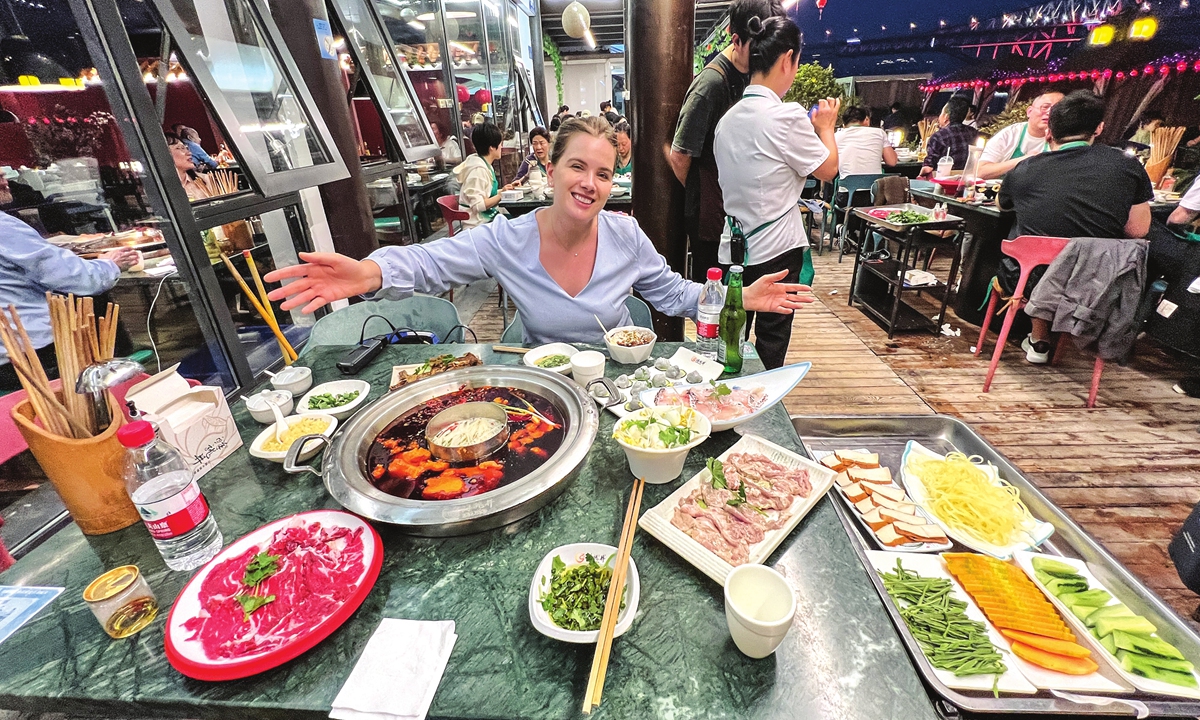
Canadian travel vlogger Alina Mcleod enjoys hotpot in Chengdu, Southwest China's Sichuan Province. Photo: Courtesy of Mcleod
To many overseas tourists, China is the very first station of their trip to Asia. With the increasing convenience of entering China, many visitors are no longer content to just walk around a few iconic metropolises like Shanghai or Beijing. Instead, they prefer to explore farther and lesser-known places, so as to take a closer look at a diverse China.
Travel content creators Flora and Note are a Canadian couple. After flying from Bangkok to Shanghai earlier this year, they started their beautiful journey across China. They took high-speed trains to Zhejiang, Jiangxi provinces and Guangxi Zhuang Autonomous Region, and then spent about 10 days exploring some fairyland-like destinations in Yunnan, such as Shangri-La.
The time in Yunnan left a lasting impression on them. "We immersed ourselves in ancient towns, learned about ethnic minorities and their food culture, and were marveled by the incredible nature," they told the Global Times.
Note mentioned a destination probably even unknown to many Chinese people: Wangxian Valley in East China's Jiangxi Province. He said the valley was a big highlight of their trip to China.
"Seeing the village's fairyland-like appearance, with houses clinging to cliffs, was breathtaking, especially when illuminated at night," he recalled. "Learning about the village's role in driving economic development in Jiangxi added depth to our visit, motivating us to raise awareness of this beautiful place among foreign visitors."
Alina Mcleod, a Canadian travel vlogger born in Ukraine, has recently been to the central and southwest parts of China. She tried on Hanfu (traditional clothing of Han ethnic group) in Chengdu, and the costume of people of the Miao ethnic group in Guilin, making her look like a beautiful local woman.
She told the Global Times that the Zhangjiajie National Forest Park in Central China's Hunan Province, also known as "The Avatar Mountains," was one of her favorite destinations in China. "It was a landscape that I had never seen before!"
Mishra also went to more places during his one-month trip in China. "Miao culture in Kaili, Lijiang River in Yangshuo, Tianmen Mountain in Zhangjiajie, Muslin's street food culture in Xi'an, and of course, ultra-modern high technology in almost every single city in China, made me speechless," said Mishra.
"I have shown [this] in all my vlogs, which the global world has to know in the right ways," he said.

Canadian travel vloggers Flora and Note enjoy the scenery beside Erhai Lake in Dali, Southwest China's Yunnan Province. Photo: Courtesy of the couple
Fascinating exploration of Xinjiang
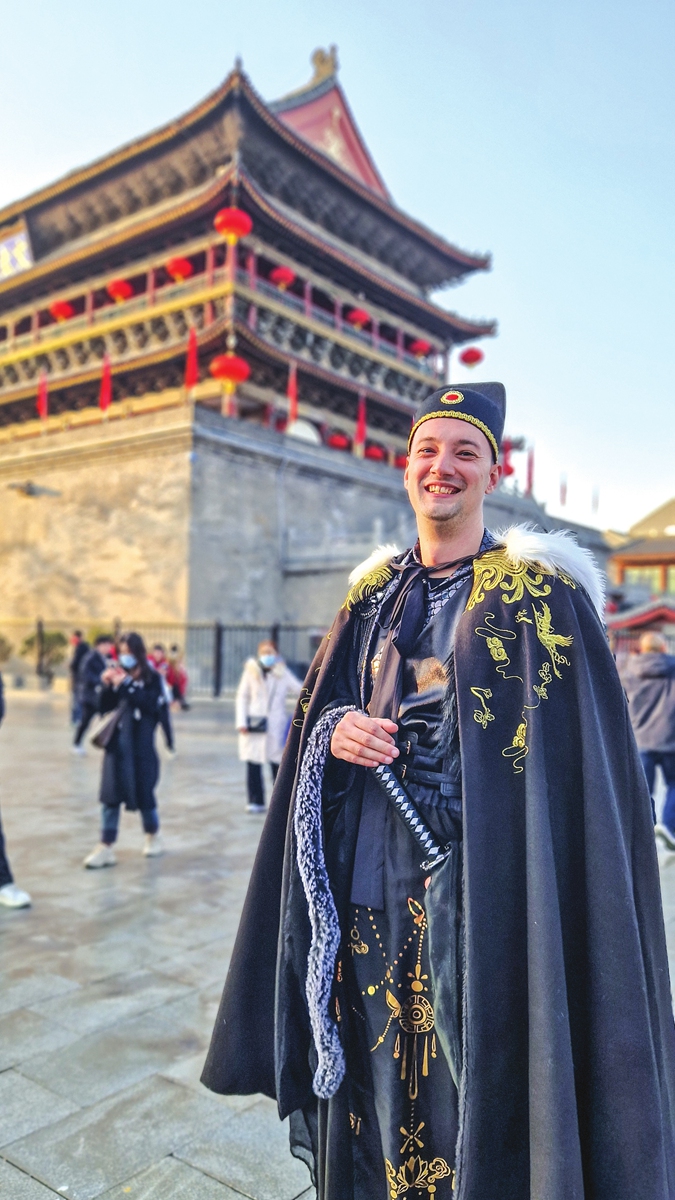
German travel vlogger "Ken Abroad" tries on ancient Chinese costume in Xi'an, Northwest Shaanxi Province. Photo: Courtesy of Ken Abroad
Travel vloggers like Mishra are a window for overseas audiences to know about a real China.
Before traveling to China, international tourists might have some concerns about this seemingly remote Eastern country, usually portrayed negatively by the West. However, when they visit China and have in-person experiences, they find that the vast majority of their previous concerns about China are entirely unfounded.
Flora and Note said that initially they worried about filming in China, as they thought they would face some resistance from local people. But later they found that filming and taking photos is a common practice, and, "as long as we weren't disrupting others, there were no issues," said the couple.
In February, Ken Abroad uploaded a video on YouTube, which showed his trip to Urumqi, the capital of Northwest China's Xinjiang Uygur Autonomous Region, a name constantly spotlighted by some Western media outlets and politicians.
"This region is all over Western media for not so good reasons. But as usual, I am curious to see things with my own eyes. So, I booked a flight to Urumqi," Ken Abroad wrote in the introduction page of the video. "According to some comments on my channel, I would not be allowed to enter, as the region is apparently closed to foreigners. Well, I was able to enter without any problems and soon after I found myself exploring the city center of Urumqi."
In this vlog, Ken Abroad walks on the snowy streets of Urumqi. He sees many mosques across the city, and asks local residents the opening time of the mosques, receiving friendly responses.
"[An] interesting fact about the mosques here, as I read before, is that Xinjiang, this region of China, has more mosques than the US or any Western countries in Europe do," he says to the camera while walking alone on the street.
"And, ...do you have the impression so far that the majority of people that we spoke to today, we interacted with, we saw, were Muslims?" he asks. "Yet the Western media are trying to tell us that the Muslims are being oppressed here by the Chinese government; that they don't live a normal life. I don't want to judge now, but just asking you, what is your impression of the people that we have seen so far?"
"I am happy to see that so many people watched my China videos, and the responses I got were overall mostly positive," Ken Abroad said.
China, on Tuesday, announced the extension of the visa exemption entry for citizens from 12 countries, including France and Germany, on short-term visits to China until the end of 2025. That will offer many foreign tourists like Ken Abroad greater ease when visiting or revisiting this country.
"It's a huge country and there are so many more places that I would like to see," Ken Abroad said. "I will probably return at the end of this year."
Obviously, there will be more travel vlogs flooding social media in the near future, as we have seen visitors from different countries excitedly declaring into the camera, "China, we are coming!"
